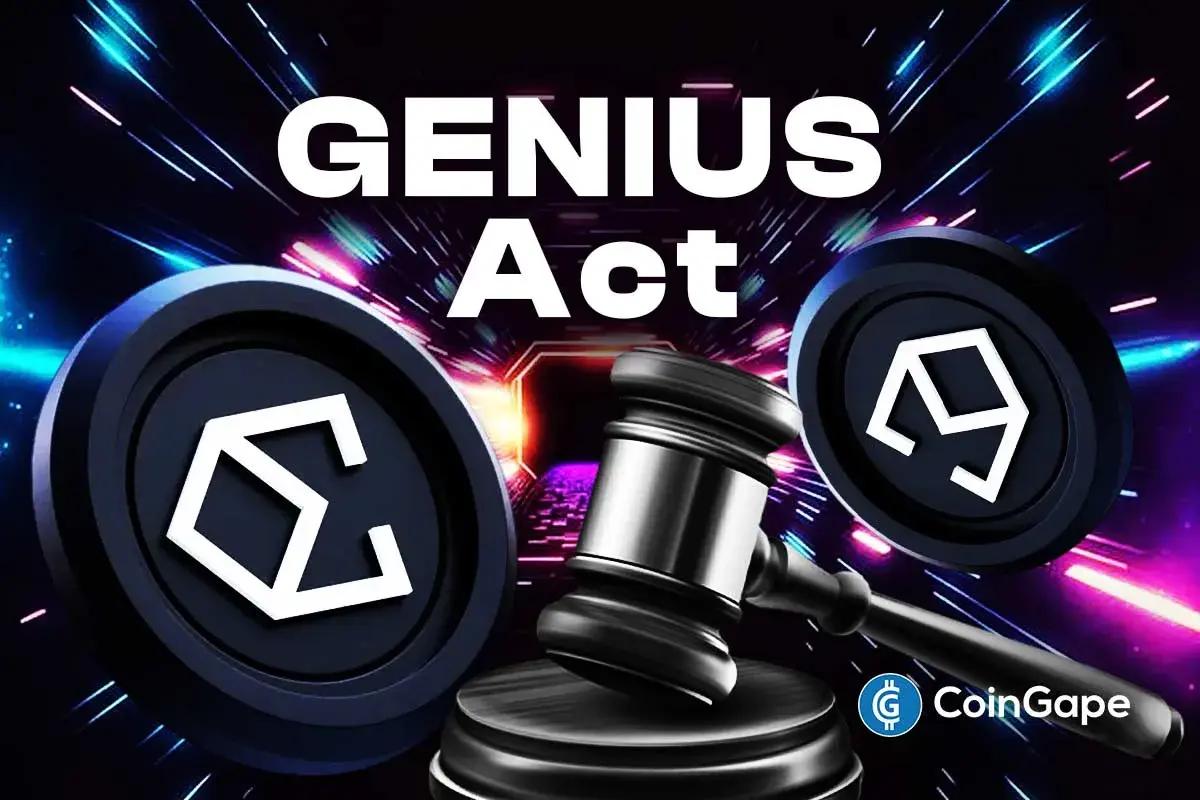U.S. Treasury Seeks Public Input on GENIUS Act Stablecoin Regulations
3 Sources
3 Sources
[1]
US Treasury calls for public comment on GENIUS stablecoin bill
The comments, due by Oct. 17, will focus on "innovative methods to detect illicit activity involving digital assets," as required by the GENIUS Act. The US Treasury Department has issued a call for comments related to the passage of the Guiding and Establishing National Innovation for US Stablecoins (GENIUS) Act, signed into law by President Donald Trump in July. In a Monday notice, the Treasury said "interested individuals and organizations" could provide feedback to the government department on "innovative or novel methods, techniques, or strategies to detect and mitigate illicit finance risks involving digital assets." Treasury officials said the call for comments by Oct. 17 was part of the requirements under the GENIUS Act. In a Monday X post, Treasury Secretary Scott Bessent called the move "essential" for implementing the law to "[secure] American leadership in digital assets." After receiving comments from the public, the Treasury will research the methods proposed and submit reports to the Senate Banking Committee and House Financial Services Committee. The bill to regulate payment stablecoins is expected to go into effect 18 months after it was signed into law on July 18 or 120 days after the US Treasury and Federal Reserve finalize regulations. The timing of the implementation suggested that the bill, one of the first crypto-related laws passed under the Trump administration, would be less likely to be used as a campaign issue for candidates potentially running on crypto policies in the 2026 midterm elections. Related: Sherrod Brown, targeted by crypto PAC in 2024, to run for US Senate again Among the potential uses for "illicit activity" for which Treasury requested comments was money laundering with crypto. The GENIUS Act also specified that the department seek feedback on application programming interfaces (APIs), AI, digital identity verification, and "use of blockchain technology and monitoring." The passage of the GENIUS Act, one of the first crypto-related bills to move out of the Republican-controlled Congress under Trump, was just one of three pieces of legislation under consideration. As part of Republicans' "crypto week" plans in July, the House of Representatives passed the GENIUS Act, the Digital Asset Market Clarity (CLARITY) Act and the Anti-CBDC [Central Bank Digital Currency] Surveillance State Act with bipartisan support. The CLARITY Act and CBDC bills have been sent to the Senate, which will remain in recess until September. Leadership at the Senate Banking Committee has suggested it intends to prioritize crypto market structure, passing its own version of the CLARITY Act by October.
[2]
US Treasury seeks comment on stablecoins
This content is provided by an external author without editing by Finextra. It expresses the views and opinions of the author. Today's request for comment fulfills Treasury's obligation pursuant to section 9(a) of the GENIUS Act, which creates a comprehensive regulatory framework for stablecoin issuers in the United States. The GENIUS Act and E.O. 14178 together promote U.S. leadership in digital assets and bolster U.S. national security. This request for comment offers the opportunity for interested individuals and organizations to provide feedback on innovative or novel methods, techniques, or strategies that regulated financial institutions use, or could potentially use, to detect illicit activity involving digital assets. In particular, Treasury asks commenters about application program interfaces, artificial intelligence, digital identity verification, and use of blockchain technology and monitoring. Innovative tools are critical to advancing efforts to address illicit finance risks but can also present new resource burdens for financial institutions. As required by the GENIUS Act, Treasury will use public comments to inform research on the effectiveness, costs, privacy and cybersecurity risks, and other considerations related to these tools. As provided in Section 9(a) of the GENIUS Act, members of the public should submit comments within 60 days of publication in the Federal Register by October 17.
[3]
U.S. Treasury Seeks Public Input on GENIUS Act Stablecoin Rules
Circle CEO Jeremy Allaire hails stablecoin law as a milestone for U.S. leadership. The U.S. Treasury has put the GENIUS Act into open consultation. The end result will be influenced by public comments, and it may fast-track the use of stablecoins globally. U.S. Treasury Seeks Comments Regarding GENIUS Act The U.S. Treasury has made a significant step regarding the GENIUS Act, a law aimed at stablecoin regulation and enhancing American dominance in the digital finance industry. Through a press release, the Treasury made a formal Request for Comment directing people to comment on how oversight over stablecoins should be done. As part of the consultation process, the department is seeking feedback on the use of new tools to combat illicit finance. These include artificial intelligence, blockchain monitoring, digital identity verification, and application programming interfaces. Public input will help determine how effective these technologies are, as well as their costs, privacy risks, and cybersecurity challenges. The deadline for comments is October 17, with all submissions posted publicly at regulations.gov. The GENIUS Act, signed into law earlier this year, creates a comprehensive framework for stablecoin issuers operating in the United States. It builds on President Donald Trump's Executive Order 14178. This is set to bolster America's leadership in digital finance technology. Previously, Trump signed an executive order allowing crypto investments in 401k plans. Treasury Secretary and Circle hail Stablecoin Regulations as Digital Finance Milestone Treasury Secretary Scott Bessent said the measure is essential for U.S. leadership in the sector. He noted that stablecoins expand global access to the dollar and increase demand for U.S. Treasuries, which back them. Bessent described the GENIUS Act as a "win-win-win" for users, issuers, and the government. A recent report also noted that U.S. Bitcoin reserves may be worth up to $20 billion, showing Washington's growing commitment to digital assets. Industry leaders have echoed this sentiment. Jeremy Allaire, CEO of Circle, welcomed the milestone, calling it more than financial legislation. He said it shows the U.S. is ready to embrace innovation that makes finance safer, more transparent, and more inclusive. Allaire credited Circle's team, bipartisan policymakers, and developers for advancing the effort. He added that this moment demonstrates the U.S. commitment to staying ahead in digital currency competitiveness. In a follow-up post, Allaire highlighted reporting from Semafor that described the GENIUS Act as the "starting gun" for a new era in financial technology. He said the internet is now colluding with the global financial system to create extraordinary opportunities. The shift reflects years of lobbying and persuasion to bring stablecoins into mainstream financial discussions, with Allaire playing a key role in convincing doubters.
Share
Share
Copy Link
The U.S. Treasury Department has called for public comments on the recently passed GENIUS Act, focusing on innovative methods to detect illicit activities involving digital assets, particularly stablecoins.
U.S. Treasury Calls for Public Comment on GENIUS Act
The U.S. Treasury Department has issued a call for public comments on the recently passed Guiding and Establishing National Innovation for US Stablecoins (GENIUS) Act, signed into law by President Donald Trump in July
1
. This move is part of the implementation process for the new stablecoin regulations, which aim to establish a comprehensive framework for stablecoin issuers in the United States.Focus on Innovative Methods to Combat Illicit Activities

Source: CoinGape
Treasury Secretary Scott Bessent emphasized that this step is "essential" for implementing the law and "securing American leadership in digital assets"
1
. The department is particularly interested in feedback on "innovative or novel methods, techniques, or strategies to detect and mitigate illicit finance risks involving digital assets"2
. Specific areas of interest include:- Application Programming Interfaces (APIs)
- Artificial Intelligence (AI)
- Digital identity verification
- Use of blockchain technology and monitoring
Deadline and Submission Process
The public has until October 17 to submit their comments
3
. All submissions will be posted publicly on regulations.gov, ensuring transparency in the process. The Treasury will use these comments to inform research on the effectiveness, costs, privacy and cybersecurity risks, and other considerations related to these tools2
.Implications for the Stablecoin Industry
The GENIUS Act is expected to go into effect 18 months after its signing or 120 days after the U.S. Treasury and Federal Reserve finalize regulations
1
. This timeline suggests that the implementation of the bill is less likely to become a campaign issue for the 2026 midterm elections.Jeremy Allaire, CEO of Circle, hailed the stablecoin law as a milestone for U.S. leadership in the digital finance sector. He described it as more than just financial legislation, stating that it demonstrates the U.S. commitment to embracing innovation that makes finance "safer, more transparent, and more inclusive"
3
.Related Stories
Broader Context of Crypto Legislation
The GENIUS Act is just one of three pieces of crypto-related legislation under consideration. As part of the Republicans' "crypto week" plans in July, the House of Representatives also passed the Digital Asset Market Clarity (CLARITY) Act and the Anti-CBDC [Central Bank Digital Currency] Surveillance State Act with bipartisan support
1
.Potential Impact on Global Finance
Treasury Secretary Bessent noted that stablecoins have the potential to expand global access to the dollar and increase demand for U.S. Treasuries, which back them. He described the GENIUS Act as a "win-win-win" for users, issuers, and the government
3
. This move reflects the growing importance of digital assets in the global financial landscape, with a recent report suggesting that U.S. Bitcoin reserves may be worth up to $20 billion3
.As the consultation process unfolds, the outcome will likely shape the future of stablecoin regulation in the United States and potentially influence global standards for digital asset oversight. The Treasury's approach, combining innovation with regulatory oversight, aims to position the U.S. at the forefront of the rapidly evolving digital finance sector.
References
Summarized by
Navi
[1]
[2]
Related Stories
Fed Governor Michelle Bowman Urges Banks to Embrace Blockchain and AI, Signaling Shift in Crypto Regulation
20 Aug 2025•Policy and Regulation

Federal Reserve to Host Payments Innovation Conference Exploring AI, Crypto, and Stablecoins
04 Sept 2025•Policy and Regulation

Rezolve Ai's AI Platform Poised to Capitalize on Stablecoin Adoption Following GENIUS Act
22 Jul 2025•Business and Economy

Recent Highlights
1
ByteDance's Seedance 2.0 AI video generator triggers copyright infringement battle with Hollywood
Policy and Regulation

2
Demis Hassabis predicts AGI in 5-8 years, sees new golden era transforming medicine and science
Technology

3
Nvidia and Meta forge massive chip deal as computing power demands reshape AI infrastructure
Technology





